News
Want to capture great video of marine life? Relax and breathe easy with your video camera
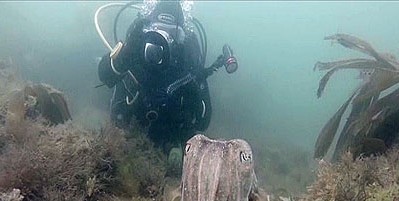
I have just finished a two day one-to-one video course in Falmouth with a young lady who wanted to know how to get the best from her video camera. She had been taking good still photos before, but had not been getting on too well with the video option on her camera.
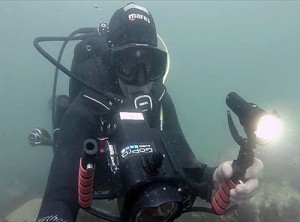 We spent the morning looking at all the best possible settings for the camera and talked about how to effectively utilise her video light. Ninety nine percent of the time I prefer to use a single hand-held light, which gives me complete control over its direction and distance from the subject. This means having my camera in one hand and the light in the other. It’s quite a tricky thing to do and good buoyancy control is essential.
We spent the morning looking at all the best possible settings for the camera and talked about how to effectively utilise her video light. Ninety nine percent of the time I prefer to use a single hand-held light, which gives me complete control over its direction and distance from the subject. This means having my camera in one hand and the light in the other. It’s quite a tricky thing to do and good buoyancy control is essential.
The afternoon saw our first dive and we decided to stay shallow in a sandy bay dotted with small clusters of rock and kelp to practice filming a short ‘diver’ sequence we had previously story-boarded. We would be too shallow to use our video lights to any great effect and so decided to use available light only. The visibility was very poor as we had previously had some bad weather and the sky was overcast giving a grey flat light underwater. On top of that there were several other divers in the area helping to stir up the sand. Never mind – it was good practice for videoing in low visibility conditions, using wide angle lenses and getting close to the subject.
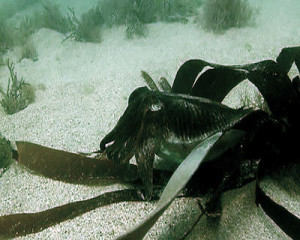
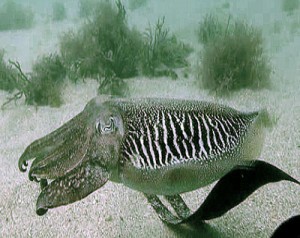 Having successfully completed our story-board shots, we looked around for something else to film. A small cuttlefish was hiding under a small loose piece of kelp and had turned itself black trying to blend in. We slowly edged closer and as soon as the cuttlefish knew it had been seen it eased out of hiding and immediately changed colour to match the surrounding sand.
Having successfully completed our story-board shots, we looked around for something else to film. A small cuttlefish was hiding under a small loose piece of kelp and had turned itself black trying to blend in. We slowly edged closer and as soon as the cuttlefish knew it had been seen it eased out of hiding and immediately changed colour to match the surrounding sand.
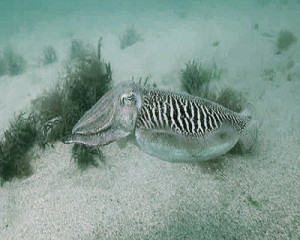 One of the key factors to successfully videoing cuttlefish, or any other shy animal, is don’t frighten it. Try not to make it think you are a predator. Avoid sudden or quick movements as getting good video or even photos of marine life is not just about the technicalities of using your camera. Patience and a little knowledge about your subject can bring great rewards. There are occasions when you get lucky and just happen to be in the right place at the right time, when taking a great shot is as easy as could be. In addition to slow movements, try very gentle and even breathing. Try to avoid holding your breath in order to get closer and then exhaling explosively in desperation to take another breath. Gentle and slow….and then there will come a singular moment when you know the animal is relaxed with you and the show is on.
One of the key factors to successfully videoing cuttlefish, or any other shy animal, is don’t frighten it. Try not to make it think you are a predator. Avoid sudden or quick movements as getting good video or even photos of marine life is not just about the technicalities of using your camera. Patience and a little knowledge about your subject can bring great rewards. There are occasions when you get lucky and just happen to be in the right place at the right time, when taking a great shot is as easy as could be. In addition to slow movements, try very gentle and even breathing. Try to avoid holding your breath in order to get closer and then exhaling explosively in desperation to take another breath. Gentle and slow….and then there will come a singular moment when you know the animal is relaxed with you and the show is on.
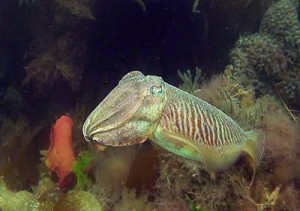 The cuttlefish eased away from us and backed into the thicker kelp for better cover. The temptation to chase can be there, but that really never works as all you end up doing is putting the animal into full flight mode.
The cuttlefish eased away from us and backed into the thicker kelp for better cover. The temptation to chase can be there, but that really never works as all you end up doing is putting the animal into full flight mode.
Although we lost sight of it, we knew it was quite relaxed and probably not too far away. It was in fact hovering low down in the kelp near the sand keeping an eye on us. Slowly moving forward we came eye to eye with the cuttlefish and began to let it know we were quite harmless. We were then able to spend the next thirty minutes with it before moving away and letting it be free of us.
I have to say that for me, this is what diving is all about, gentle and close interactions with marine animals and capturing those moments on video.
We reviewed the dive video later in the afternoon and discussed how to improve shots and techniques for any future edit. We put the clips together with some music and a brief narration which can be seen below.
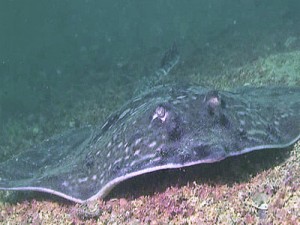
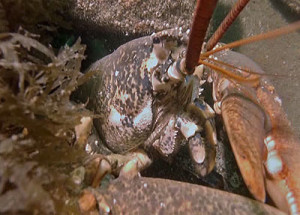 The next day we had two deeper dives and so were able to make use of our lights to bring out the hidden colour of the animals we filmed. Again, by approaching animals slowly, we were able to get close and not frighten anything away. It’s an incredible marine world around our coasts and by taking time to explore and observe with your camera, the true wonders of our wildlife will present themselves to you.
The next day we had two deeper dives and so were able to make use of our lights to bring out the hidden colour of the animals we filmed. Again, by approaching animals slowly, we were able to get close and not frighten anything away. It’s an incredible marine world around our coasts and by taking time to explore and observe with your camera, the true wonders of our wildlife will present themselves to you.
[youtube id=”XNzt4xZ-Tmg” width=”100%” height=”400px”]
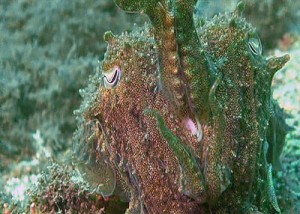 For more information on cuttlefish, click here.
For more information on cuttlefish, click here.
If you would like to know more about underwater videoing and join a course, contact Jeff at uwv@scubaverse.com or jeffgoodman@supanet.com.
Gear News
Introducing the TR-80, IR-50 and CS-30 Regulators from DYNAMICNORD

Whether you are a beginner or a professional diver – with the three new main regulators from DYNAMICNORD, everyone will find their favourite regulator. They all look super stylish.
Excellent performance with the TR-80
Quality and performance are the be-all and end-all for regulators. It is not for nothing that the TR stands for Tec Reg. The innovative design of the TR-80 guarantees absolute reliability – even in ice-cold waters.

Perfect breathing effort at 0.8 J/l / certified for diving in waters below 10 degrees / structural design made of solid brass for best cold protection / membrane-compensated design with dry seal of the first stage / reduced exhalation effort thanks to optimized exhalation membrane and bubble deflector / adjustable Venturi (dive/predive) and adjustment knob for individual inhalation comfort / innovative design of the front cover prevents free-flow in strong currents or when diving with scooters / design made of sandblasted brass, matt chrome finish / 2 HP and 4 LP outlets / mouthpiece made of high-quality, anti-allergic silicone for maximum comfort.


Amazing underwater adventures with the IR-50
The IR-50 is the top regulator for advanced and experienced divers. Natural breathing is the essence of this regulator.

Ideal breathing effort at 0.8 J/l /certified for diving in waters below 10 degrees / compensated membrane / adjustable venturi (dive/predive) and adjustment knob for individual inhalation comfort/ outlet valve and deflector for minimum exhalation effort and reduction of bubbles on the face / design made of sandblasted brass, matt chrome finish / 2 HP and 4 NP outlets / mouthpiece made of high-quality, anti-allergic silicone for maximum comfort.


The Workhorse – our CS-30
For diving centres and diving beginners – the workhorse stands for strong construction, reliability and robustness. Perfect for your training.

Optimal breathing effort at 0.8 J/l /recommended for diving in waters above 10 degrees / non-compensated piston / adjustable venturi (dive/predive) / outlet valve and deflector for minimum exhalation effort and reduction of bubbles on the face / design made of sandblasted brass, matt chrome finish / 1 HP and 3 NP outlets / mouthpiece made of high-quality, anti-allergic silicone for maximum comfort.


Octopus OP-30
The OP-30 is the ideal addition to all DYNAMICNORD regulators. It is identical in construction to the CS-30.

The TR-80, IR-50, CS-30 (DIN & INT) regulators and the Octopus OP-30 are available from DYNAMICNORD dealers and in the online store.
DYNAMICNORD – Your Outdoor Companion.
Marine Life & Conservation
Paul Watson Released as Denmark Blocks Japan’s Extradition Bid

Renowned anti-whaling activist Paul Watson has been released from custody in Greenland after spending five months in detention. Denmark’s Justice Ministry rejected Japan’s request for his extradition, citing insufficient guarantees that his time already served in custody would be credited against any potential sentence.
The 74-year-old Canadian-American was arrested on July 21 in Nuuk, Greenland’s capital, when his ship docked to refuel. His arrest was based on a 2012 Japanese warrant related to a 2010 encounter in Antarctic waters. Japan alleged Watson obstructed operations and caused damage to a whaling research ship during efforts to disrupt illegal whaling. Watson has consistently denied these claims, maintaining his commitment to marine conservation.
Denmark, which oversees extradition matters for Greenland, concluded that while the legal conditions for extradition were met, the lack of assurances from Japan regarding time-served credit made extradition untenable.
In a video shared by his foundation, Watson expressed gratitude and relief, saying, “After five months, it’s good to be out… and good to know they’re not sending me to Japan.” He added that the most difficult part of his time in custody was being separated from his two young sons.
Watson is a pioneering figure in marine conservation, known for founding the Captain Paul Watson Foundation in 2022 after decades of activism with the Sea Shepherd Conservation Society. His bold efforts to defend marine life have earned him widespread support, including from celebrities and conservationists. His work has also been featured in the acclaimed reality TV series Whale Wars.
Watson’s lawyer, Jonas Christoffersen, praised the decision, stating, “We are happy and relieved that Paul Watson is now free.” He added that Watson is eager to reunite with his family and continue his vital work.
The arrest occurred while Watson’s vessel, the M/Y John Paul DeJoria, was en route to the North Pacific with a team of 26 volunteers to intercept a Japanese whaling ship. His foundation described the arrest as politically motivated and emphasized that Watson’s actions were focused on ending illegal whaling practices.
Japan resumed commercial whaling in 2019 after leaving the International Whaling Commission, asserting that whale meat is a cultural tradition. Conservationists, however, continue to challenge these practices, highlighting their impact on marine ecosystems.
Despite the challenges, Watson remains steadfast in his mission to protect marine life and bring attention to whaling practices. His dedication to ocean conservation has made him a globally respected advocate for the environment.
-

 News2 months ago
News2 months agoIconic SS United States to become the World’s Largest Artificial Reef
-

 News3 months ago
News3 months agoBook Review – 52 Assignments: Underwater Photography
-

 Gear News3 months ago
Gear News3 months agoDYNAMICNORD – New German diving brand enters the British market
-

 News3 months ago
News3 months agoExploring Cenote El Pit: A Diver’s Dream
-

 Gear News3 months ago
Gear News3 months agoTry BARE drysuits (and maybe even win one!) this Friday with Sea & Sea at North West Dive Fest
-

 Marine Life & Conservation3 months ago
Marine Life & Conservation3 months agoBook Review: Coral Triangle Cameos
-

 Blogs2 months ago
Blogs2 months agoDive the Egyptian Red Sea this Autumn with Regaldive
-

 News3 months ago
News3 months ago2024 Ocean Art Underwater Photo Competition Announced















